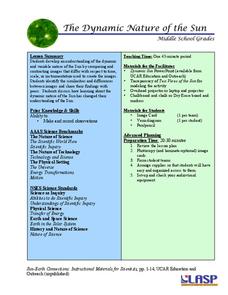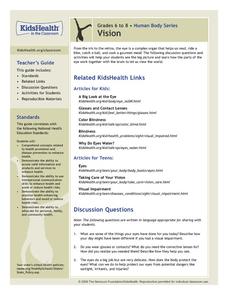NASA
Earth's Global Energy Budget
Introduce your earth science enthusiasts to the earth's energy budget. Teach them using an informative set of slides that include illuminating lecturer's notes, relevant vocabulary, embedded animations, colorful satellite maps, and a...
Teach Engineering
Maximum Power Point
Investigate the maximum power output of a photovoltaic panel with a lesson that introduces the class to the maximum power point. Individuals learn how to determine the maximum power point of a solar panel by using Ohm's law and the power...
Teach Engineering
Photosynthesis—Life's Primary Energy Source
Wouldn't it be great if you could produce your own food? Scholars learn about the processes of photosynthesis and cellular respiration in plants. They consider how to use photosynthesis as a model of an efficient system and how to apply...
Laboratory for Atmospheric and Space Physics
Jupiter’s Relative Size
How do you properly illustrate the extreme size difference between two planets—Earth and Jupiter? With the help of jellybeans, of course! Create a scale model of Jupiter's mass compared to Earth using a fishbowl, 1,400 beans, and a dixie...
Laboratory for Atmospheric and Space Physics
Charting the Progress of New Horizons
In 2006, New Horizons began its mission to fly to Pluto. As it continues its journey, scholars track its progress with the help of an informative website, all the while reinforcing measurement concepts with the construction of a scaled...
Workforce Solutions
A Colony for Lunar Living
Two lessons explore the possibility of living on the moon. First, scholars read various scenarios to identify which careers would best transfer to life in space. Finally, pupils examine a website to locate items made for outer space,...
Bonneville
Introduction to the Photovoltaic Effect
Let a video light the way to a better understanding of solar energy. Scholars first learn vocabulary terms related to the photovoltaic effect, solar cells, and electricity. They then watch a video to learn why silicon is often used as a...
Curated OER
Making Regolith
You may not be able to take a field trip to the moon, but that doesn't mean your class can't study moon rocks. Using graham crackers as the moon's bedrock and powdered donuts as micrometeorites, young scientists simulate the creation of...
NASA
Let's Investigate Mars
Take your science class on a hypothetical field trip to Mars with an engaging astronomy lesson. After first learning about NASA's Mars rover missions, young scientists plan their own scientific investigations of Earth's nearest neighbor.
Teach Engineering
Air Under Pressure
Introduce your class to air masses and how they affect the weather with a lesson that focuses on the differences between high and low air pressure systems. The class explores actual weather data using archived weather data.
PHET
The Dynamic Nature of the Sun
In this second instructional activity of the series, pupils learn to observe similarities and differences in photos of the sun and record them in a Venn diagram. Then, small groups practice the same skill on unique images before...
Space Awareness
Climate Zones
The climate at the equator is hotter than the climate at the poles, but why? The lesson goes in depth, explaining how the angles of illumination relate to the heating rate at different latitudes and seasons. Scholars use a strong lamp,...
Nemours KidsHealth
Vision
From the iris and retina to glasses and contact lenses, learners will be excited to see what activities are in store for them as they learn about the complex organ of the human eye.
National Endowment for the Humanities
Galileo: Revealing the Universe
To gain an understanding of the significance of Galileo Galilei's revolutionary ideas, class members watch the short video "Stargazing Before Galileo," and conduct a close reading of Galileo's Sidereal Messsenger. They then compare...
University of Colorado
Are All Asteroids' Surfaces the Same Age?
Did you know scientists can tell the age of an asteroid by looking closely at its craters? This final lesson of a six-part series focuses on two asteroids, Gaspra and Ida, in order to demonstrate the concept of dating asteroids. Scholars...
University of Colorado
Phases of Charon
Pluto, although no longer considered a planet, has five moons. Pluto's moon, Charon, is the focus of a resource that describes how the moon is viewed from the surface of Pluto. Photos help individuals see how Charon would look at...
UAF Geophysical Institute
Carbon Footprint
Your young environmentalists can calculate their carbon footprint and discuss ways to reduce it with a worksheet about climate change. After reading a handout about what impact one's carbon footprint can have on the environment, kids...
Messenger Education
Give Me a Boost—How Gravity Assists Aid Space Exploration
The propellant needed for space explorations runs in the thousands, while paying to get the craft into orbit costs millions! In the second installment of three, two activities explore laws of conservation of energy and momentum. Using...
Science 4 Inquiry
The Impact of the Sun and Moon on Tides
In 150 BC, Seleucus of Seleucia theorized that the moon causes the tides. Scholars learn about what causes tides by studying the interactions of gravity between the sun, moon, and Earth. They use technology to formalize otherwise...
Ventura County Air Pollution Control District
Effects of Global Warming
Your learners have probably heard of climate change, but do they really understand what it is? Study the history, details, and future implications of global warming and the greenhouse effect with a set of activities designed for an...
Carnegie Mellon University
Home Energy Audit
Youngsters make a mental assessment of electricity-consuming appliances in their homes and then evaluate them for the amount of energy consumed. They learn how to use power meters and measure the electrical consumption of several...
Teach Engineering
Weather Basics
Weather — there's more to it than meets the eye of the storm. With this resource young meteorologists learn about the basics of weather, including information about the factors that influence the weather, common weather vocabulary, and...
Other popular searches
- Solar System Crossword
- Solar System Worksheets
- Solar System Word Search
- Solar System Art
- The Solar System
- Solar System Lesson Plans
- Solar System Math
- School Projects Solar System
- Components of the Solar System
- Solar System Model
- Earth Movement Solar System
- Solar System Constellations























